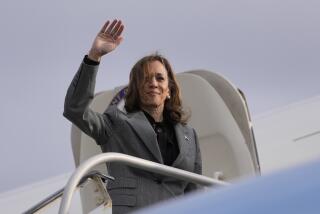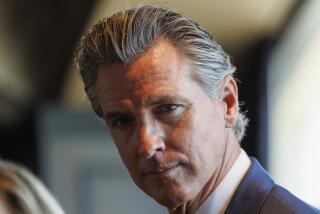Bush’s Support of Term Limits Turns Up Heat
- Share via
President Bush’s endorsement of term limits for state legislators and members of Congress could reshape the politics of the issue, accelerating its transformation from a populist struggle between insiders and outsiders into a partisan battle between Democrats and Republicans, analysts say.
With that possibility in sight, some leading term limit supporters expressed mixed emotions over Bush’s endorsement Friday of a limit-setting initiative on the California ballot.
On one hand, advocates welcomed the increased visibility that presidential support brings to the issue. But many worry that his high-profile involvement will allow opponents to characterize term limitations as a Republican attempt to accomplish through procedural reform what the party has been unable to do through direct elections: dislodge Democratic majorities in Congress and most state legislatures.
“There was no need for the President to get involved in it,” said Eddie Mahe, a GOP consultant who has backed term limitation efforts, “because it adds a partisan tone to the cause that does it no good.”
In fact, partisan tones already have begun to color the issue, if unevenly. Though polls show overwhelming public support for limiting congressional terms, a recent New York Times/CBS survey showed the margin of support was only about half as great among rank-and-file Democrats as among Republicans.
A handful of prominent Democrats and liberals have endorsed term limitations, among them consumer activist Ralph Nader, Massachusetts gubernatorial candidate John R. Silber, Texas gubernatorial candidate Ann Richards, Colorado Senate nominee Josie Heath and California Atty. Gen. John K. Van de Kamp, who launched one of the two term limit initiatives on next month’s state ballot.
But more leading Republicans have signed up for the cause, which was endorsed in general terms in the GOP’s 1988 platform. The initiative Bush endorsed Friday was launched by Republican Los Angeles County Supervisor Pete Schabarum. In Colorado, Republican state Sen. Terry Considine led the drive that put a term limit initiative on this year’s ballot. Mahe, the GOP political operative, has organized a group called Americans to Limit Congressional Terms to support grass-roots drives around the country, and other Republican strategists have expressed interest in encouraging such efforts.
Vice President Dan Quayle backed the idea weeks before the President. Florida Gov. Bob Martinez has endorsed term limitations, as have Sen. Pete Wilson and Clayton W. Williams, the GOP gubernatorial candidates in California and Texas, respectively. Four GOP Senate challengers--all of them current or former congressmen--are also calling for limits.
Though some Republicans, such as former President Ronald Reagan, don’t like the idea, opposition has been much more intense among Democrats. Organized labor fought the limit initiative that Oklahoma voters approved last month. In Colorado, Democratic Rep. Patricia Schroeder has been among the most outspoken opponents of the state ballot initiative, which attempts to limit the terms not only of local legislators but the state’s congressional delegation as well. In California, the campaign against the term limit initiatives is being bankrolled and organized by Democrats in the state Legislature, and gubernatorial nominee Dianne Feinstein has joined them in opposing the measures.
None of this is difficult to understand: With control of more than two-thirds of all state legislative chambers, and majorities in both houses of Congress, Democrats have the most to lose from any reform that diminishes the advantages of incumbency.
But with Bush’s endorsement, some believe, the possibility grows that opponents may persuade voters that Republicans are pushing term limits in their own self-interest. That debate will begin in the last days of this campaign, but it is more likely to emerge in 1992.
By then, Mahe predicts, measures to limit the terms of state legislators could be on the ballot in as many as 12 to 15 states. And if courts uphold Colorado’s attempt to fix a limit for its federal legislators in state law, “that could also be on the ballot in a number of states,” Mahe said.
Also on the ballot in 1992, of course, will be President Bush, who many believe has raised the issue to begin distancing himself from public disgust with Washington. Reagan neatly managed the trick of running against the government he headed. But most analysts anticipate that will be more difficult for Bush, whose resume reads like a condensation of the Federal Directory.
“George Bush is a prep school, patrician, political insider and that severely limits his ability to tap grass-roots resentment across the country,” said Stu Rothenberg, publisher of the Political Report, a Washington-based campaign newsletter.
More to Read
Get the L.A. Times Politics newsletter
Deeply reported insights into legislation, politics and policy from Sacramento, Washington and beyond. In your inbox twice per week.
You may occasionally receive promotional content from the Los Angeles Times.









